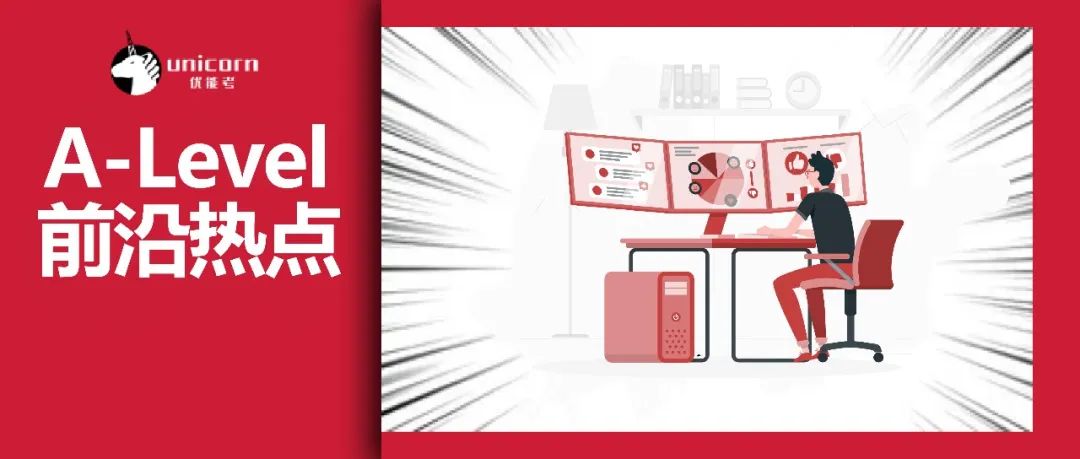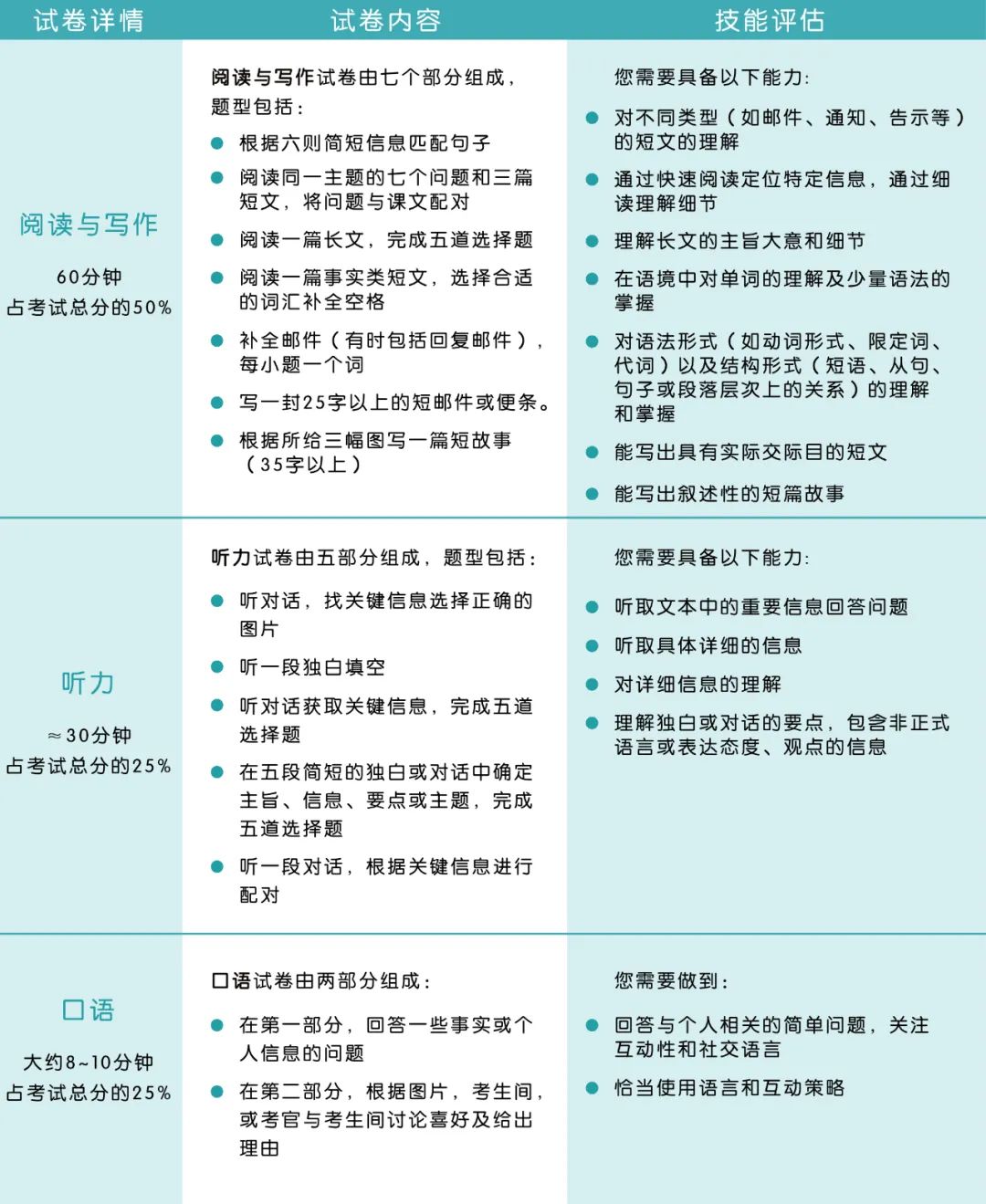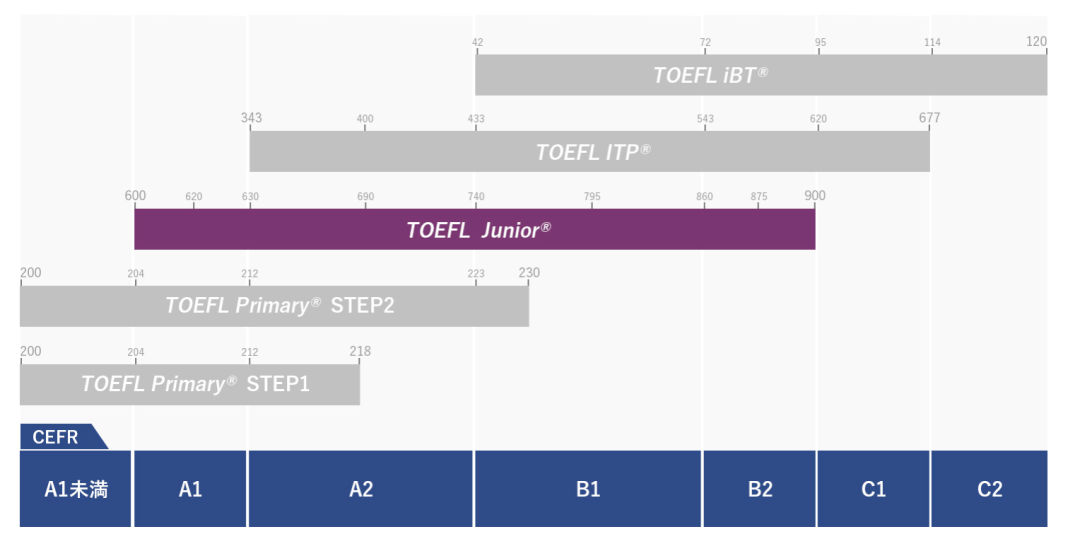2022年全国大学生英语竞赛样题(A类)
2022 National English Competition for College Students
(Type A - Sample)
(Total:150 marks Time:120 minutes)
Part I Listening Comprehension (30 marks)
Section A (5 marks)
In this section, you will hear five short conversations. Each conversation will be read only once. At the end of each conversation, one question will be asked, and you have fifteen seconds to read the four choices marked A, B, C and D, and decide which is the best answer. Then mark the corresponding letter on the answer sheet with a single line through the centre.
1.A. In a hospital.
B. At a coffee shop.
C. At a laundry.
D. In a hotel.
2. A. The front page headlines.
B. The back page main stories.
C. The financial news.
D. The sports news.
3. A. Getting stuck in rush hour traffic.
B. Being stopped by the police.
C. A car breakdown.
D. A flat mobile phone battery.
4. A. The salary is too low.
B. It is not challenging.
C. He doesn’t like his workmates.
D. He has to work many hours.
5. A. Because growing potatoes will involve less labour.
B. Because the backyard isn’t big enough for growing corn.
C. Because the soil in the backyard isn’t fit for growing corn.
D. Because growing potatoes will be more profitable.
Section B (10 marks)
In this section, you will hear two long conversations. Each conversation will be read only once. At the end of each conversation, there will be a one- minute pause.
Conversation One
Listen to the conversation. Then read the four choices marked A, B, C and D, and decide which is the best answer according to what you hear. Then mark the corresponding letter on the answer sheet with a single line through the centre.
6. What is the woman trying to do?
A. Persuade the man to take a rock-climbing course.B. Find a place to go rock-climbing with the man.C. Make preparation for a rock-climbing contest.D. Plan a rock-climbing trip during the spring break.
7. What does the man imply about rock-climbing at their school?
A. There is no one to teach them how to do it.B. Not very many students are interested in it.C. The school doesn’t have any rock-climbing equipment.D. There are no proper places for rock-climbing nearby.
8. Which of the following may not be needed for rock-climbing?
A. Helmets.B. Parachutes.C. Ropes.D. Belts.
9. Why is the woman interested in rock-climbing?
A. It helps climbers develop mentally as well as physically.B. It offers climbers the opportunity to enjoy the scenery.C. It isn’t as expensive as other sports.D. It doesn’t take a long time to learn.
10. What will the first few weeks of the rock-climbing course focus on?
A. Attending lectures on rock-climbing.B. Learning to use the various gadgets.C. Exercising mentally and physically.D. Getting familiar with the climbing sites.
Conversation Two
Listen to the conversation, and complete the following sentences with one word according to what you hear. Write the answers on the answer sheet.
11. Chris is surprised that Holly has left the ( ) .
12. Holly was getting too far behind with her ( ) and wanted to concentrate more on her college work.
13. Holly said last term she was able to keep up and her ( ) were fine.
14. Dr Garrett made Holly go and see the ( ) of department on Monday.
15. Chris believes it’s necessary for students to have a ( ) job.
Section C (5 marks)
In this section, you will hear five short news items. Each item will be read only once. A fter each item, there will be a fifteen- second pause. During the pause, read the question and the four choices marked A, B, C and D, and decide which is the best answer. Then mark the corresponding letter on the answer sheet with a single line through the centre.
16. Where are the microchips embedded?
A. In the food.B. In the recipes.C. In the attached tag.D. In the packaging.
17. What is special about the air-borne taxi Jetpod?
A. Its safety.B. Its speed.C. Its low noise output.D. Its relatively low fare.
18. What do we learn about the new swimming pool?
A. It will open next month.B. It will be free for one week.C. It is bigger than the old one.D. It will be open sooner than expected.
19. Who are main customers of the BlackBerry?
A. Reporters.B. Music lovers.C. Executives.D. Blue-collar workers.
20. Why were some neighbours unhappy?
A. The police had taken too long to find the children.
B. They didn’t realize the children were so naughty.
C. The police had not done their best in the search for the children.
D. They thought the children’s parents were careless and irresponsible.
Section D (10 marks)
In this section, you will hear two short passages. The passages will be read only once. A fter each passage, there will be a one- minute pause.
Dictation
Listen to the passage, and fill in the blanks with the exact words or phrases you hear. Write the answers on the answer sheet.
The traditional Chinese lunar calendar divides the year into 24 solar terms. Minor Snow, (Chinese: xiaoxue), the 20th solar term of the year, refers to the time when it starts to snow, mostly in China’s northern areas, and the temperature (21) to drop.
An ancient Chinese book about plants explains that “in Minor Snow, the weather is cold and it is going to snow, while the earth is not frozen enough and the snow is light.”The temperature in most areas in the north drops to zero degrees and below. Meanwhile, in the lower and middle reaches of the Yellow River, the (22) of the first snow falls during the Minor Snow solar term. The snow is light and frozen at night, but melts quickly during the day.
In China, starting in Minor Snow, the wind blows from the northeast a lot. Because it’s still not (23) cold, many people do not wear hats or scarves yet. In fact, according to an old Chinese saying, “the head is the place where all passages of the body gather”. It’s sensible to keep one’s head warm.
During Minor Snow, (24) begins to work, which means the air indoors is dry and most people might find their nose and mouth feel a bit dry. According to practices in traditional Chinese medicine, this (25) of “inner heat”in one’s body can cause problems, including oral ulcers and breakouts. The solution is to drink more hot soup, such as cabbage and bean curd soup, spinach and bean curd soup, and mutton and radish soup.
Summary
Listen to the passage, and complete the table using one or two words or one number for each blank according to what you hear. Write the answers on the answer sheet.
Medical Inventions

Part II Vocabulary & Grammar (15 marks)
There are 15 incomplete sentences in this part. For each blank there are four choices marked A, B, C and D. Choose the one that best completes the sentence. Then mark the corresponding letter on the answer sheet with a single line through the centre.
31. If a person talks about his weak points, his listener is expected to say something in the way of ( ) .
A. assurance
B. confirmation
C. encouragement
D. persuasion
32. In science fiction we read of flying saucers travelling through ( ).
A. space
B. a space
C. the space
D. spaces
33. The chimney is no longer ( ) volumes of waste gas into the atmosphere, as protective filters are being used.
A. giving away
B. giving in
C. giving off
D. giving up
34. Every university student should be encouraged to know ( ) own potentialities and to weigh the chances of developing ( ).
A. his; it
B. their; them
C. their; it
D. /; them
35. The police accused him of setting fire to the building but he denied ( ) in the area on the night of the fire.
A. been
B. to be
C. to have been
D. having been
36. ( ) the calculation is right, scientists can never be sure that they have included all variables and modeled them accurately.
A. Even if
B. As far as
C. If only
D. So long as
37. “You’re very selfish. It’s high time you ( ) that you aren’t the most important person in the world,” Geoff said to his boss angrily.
A. realized
B. have realized
C. realize
D. should realize
38. The most versatile embryonic stem cells, which found in the embryo at the earliest stage of development and grow into any part of the body.
A. is; is
B. are; are
C. are; is
D. is; are
39. Among the first to come and live in North America ( ), who later prospered mainly in New England.
A. have been Dutch settlers
B. Dutch settlers were
C. were Dutch settlers
D. Dutch settlers had been
40. Other students had poorer exam results—he is by no means ( ) in the class.
A. better
B. the best
C. worse
D. the worst
41. ( ) the demand for fish and seafood increases, people wouldn’t need to rely on land animals for food.
A. As
B. For
C. Although
D. With
42. This new building in Shanghai is different ( ) each of its stories is complete in itself.
A. from that
B. from which
C. in that
D. in which
43. Hilary: How about going to the town pool now, Joan? Or we could always swim at the lake.
Joan: ( ). What would you prefer to do?
Hilary: I think I’d prefer to go to the town pool.
A. Good idea. I’ll call you in the morning
B. I’m afraid I have to do my assignment
C. It doesn’t make any difference to me
D. OK. That’s fine with me
44. Joseph: You’re looking so happy. ( )
Robert: Well, actually, I have some good news.
Joseph: Really? What?
Robert: I just got a big pay rise.
Joseph: You did? ( )
A. How is it going?; That’s nothing.
B. What’s new?; Congratulations!
C. That’s wonderful! ; That’s great!
D. Something wrong with you?; It’s extremely good!
45. Rosie: Sorry, I overslept. ( ) .
Francis: Again?
Rosie: That’s right, even though I did set the alarm last night.
Francis: Your clock never works. Perhaps you should buy a new one.
A. My clock was lost
B. My clock moved quickly
C. My clock worked well this morning
D. My clock didn’t go off this morning
Part III Cloze ( 10 marks)
Read the following passage and fill in each blank with one word. Choose the correct word in one of the following three ways: according to the context, by using the correct form of the given word, or by using the given letter(s) of the word. Remember to write the answers on the answer sheet.
He had just (46) gra( ) from Harvard University and was living in Manhattan. He loved the city and was beginning to feel at home on its streets. World War II was raging in Europe, and like all other good citizens, he followed the headlines daily and did his part for the boys overseas.
Hugging his jacket close, he stood shivering at the corner, waiting for the light to change and wondering (47) ( ) his enlisted friends might be staying on that cold winter night. He hoped they were safe. He shivered, only partially from the cold, and looked around him at the bright lights of Times Square. He was never (48) ( ) of this glittering scenery.
His eye was caught by two men who were dressed in the (49) uni( ) of the Royal Air Force from England. They must be on leave, he thought. The men stopped him, glanced quickly at their watches, and then nodded and grinned at him. The taller of the two asked him, in the clipped accent of the British, if this was Time Square. He suppressed a smile at such a touristy question and said that it was.
The light changed, and the two RAF pilots fell into step with the Harvard graduate as he crossed the street. The three men fell into conversation together as they wandered along the (50)( ) (shine) streets. The Brits were thrilled to be in Times Square after all they had suffered in the war. They didn’t go into detail about their wartime experiences, and he didn’t press them. He just enjoyed their pleasure in the scene, which was marred only by the frequent checking of their watches. Finally, he asked if they had someplace to be, but they said they were free for the evening. He promptly invited them to have dinner with him at the Harvard Club, and the RAF pilots gladly (51) ac( ) .
The three men repaired immediately to the Harvard Club, where they dined leisurely and chatted late into the evening. The RAF pilots were good company and told many stories, although they glossed over their experiences in the war. They continued to check their watches frequently throughout the night, but he decided it was just a nervous habit they had picked (52)( ) somewhere; possibly in the air force.
As midnight approached, the two RAF pilots excused themselves and rose from the table. They thanked the Harvard man for a (53) ( ) (memory) evening and started for the door. Then the tall pilot turned back and told their host that they had always wanted to visit Times Square, but never had the opportunity. It was strange, the pilot added, that they had to wait until after they were dead, killed in action when their planes were shot down the night before over Berlin, to fulfill this dream.
The Harvard man (54)( ) (stiffen), his eyes widening incredulously and his mouth falling open in shock. He gasped but couldn’t speak. The phantom RAF pilot smiled sardonically at him, nodded, and joined his friend in the doorway. Then the pilots vanished before the (55) as( ) man’s eyes, just at the stroke of twelve midnight.
Part IV Reading Comprehension (30 marks)
There are three passages in this part. Each passage is followed by several questions. Respond to the questions using information from the passage. Remember to write the answers on the answer sheet.
Section A (10 marks)
Questions 56 to 60 are based on the following passage.
Over 1,000 years ago, Chinese poet Wang Wei of the Tang Dynasty (618—907) wrote “I know my brothers would, with dogwood spray in hand, climb up mountain and miss me so far away”—to express his nostalgia during Chongyang Festival.
(56)( )
The Chongyang Festival, or the Double Ninth Festival, which takes place on the ninth day of the ninth lunar month on the Chinese calendar.
According to I Ching, or Book of Changes, “nine”is a positive—or yang—number. Therefore, the ninth day of the ninth month means“double nine”or“double yang”. (57)( )
Through records in all kinds of notes and historical literature, scholars have dated Chongyang’s history back to the Warring States Period (475—221 BC). It became widely celebrated after the Wei and Jin dynasties (220—420) and was officially declared to be a festival during the Tang Dynasty.
(58)( )So, it was not uncommon for superstitious folk to climb mountains, or find higher ground to avoid some perceived oncoming doom.
Today, customs during this festival include climbing mountains, enjoying chrysanthemum flowers, drinking chrysanthemum wine, eating crabs, wearing dogwood to drive away ghosts and composing poems.
(59)( )Moreover, standing on high ground and looking far into the distance on a balmy autumn day can help alleviate some of the seasonal depression and anxiety. If you can’t find a mountain to hike up, there is another solution: Ascending buildings or towers will, apparently, also work. For example, Wang Bo, a man of letters in the Tang Dynasty once ascended a tower on the Chongyang Festival and wrote his representative work, A Tribute to King Teng’s Tower.
Mountains aside, chrysanthemum symbolizes longevity, as well as integrity and chrysanthemum wine is seen as an auspicious drink to enjoy during the festival. It is believed that the custom originates from poet Tao Yuanming who lived during the Eastern Jin Dynasty (317—420) and was famous for his hermit’s lifestyle and his special love for the flower.
Special food is usually an indispensable part of festivals, just like mooncakes for the Mid-Autumn Festival and zongzi for the Dragon Boat Festival. So, for Chongyang, crabs are the snack du jour because that’s when their meat is at its best. Chongyang cake, made of rice, is also a traditional festival food popular in the eastern part of China.
(60)( )Since the pronunciation of nine in Chinese is the same as “eternal”or “forever”, the festival is regarded as an especially auspicious day to wish longevity and health upon our senior citizens and people usually visit, or send greetings to, the senior members of their family.
As a result, in 1989, the Chinese government assigned yet another moniker to the festival to promote respect for the elderly: Senior Citizens’ Festival.
Questions 56—60
Choose from the sentences A—G the one which best fits each gap of 56—60. There are two extra sentences which you do not need to use.
A. In ancient China, the Chongyang Festival was sometimes seen as a bad omen, as it fell in the late autumn when the weather turns cold and plants wither.
B. The dogwood is a plant with a strong fragrance, and is often used as a Chinese herbal medicine.
C. Today, it is still celebrated by people from China, the Republic of Korea and Japan.
D. Today, thankfully, the Chongyang Festival has a more positive meaning.
E. The bright clear weather and the joy of bringing in the harvest make for a festival’s happy atmosphere.
F. Since“chong”means double in Chinese, it is also called“Chongyang”in China.
G. Among all these customs, mountain climbing is the most important one since it is an activity that is believed to help one avoid misfortune.
Section B (10 marks)
Questions 61 to 65 are based on the following passage.
This is the incredible story of a mother’s journey to keep her family alive. Echo is a wise elephant matriarch in her sixties. She lives in Southern Kenya alongside fifteen hundred other wild African elephants. As the oldest female and head of the family, Echo must guide four generations of her relatives through the cruel famine that follows the failure of the latest rains, protect them from attack by lions, and keep them away from growing conflict with angry Maasai farmers. Observing her as they have for the past four decades are American scientist Cynthia Moss and her team from the Amboseli Trust for Elephants. Echo leads her family out of harm’s way, steers clear of battling tuskers, prevents clashes with neighbours over water, crops or grazing, and avoids natural calamities like deadly mud traps. As the months pass, she must prevent her family splitting under pressure, and finally bring new babies into the world with the best chance of survival.
In Kenya’s Amboseli National Park Echo keeps watch over her large family. The African Elephant Conservation Trust has followed her life for more than 30 years. Echo is sensitive and caring when with her family, but becomes fearless when threatened by animal or man. Her leadership qualities are admirable as she guides her family through danger.
When Echo was first found and studied by the Conservation Trust, she was 23 years old. Having just survived the deaths of the more senior members of the herd, she had adopted a motherly role for seven of her family. Once, when her 10 -day -old calf was kidnapped by other elephants, Echo encouraged three adult females from her own herd to help her to track and attack the enemy and successfully rescued the baby. Poachers, hunters, famine and drought have all taken their toll on Echo’s extended family, yet thanks to her successful leadership through many difficulties, the herd has now grown to 27 members of different ages.
Meanwhile, Echo has become world famous, thanks to three films about her life and behaviour, by award-winning film-maker Martyn Colbeck. His work has changed public perception of elephants by demonstrating the high level of intelligence and social behaviour of these complex creatures. The respect and interest generated by the films have helped to save this species, which at one time was threatened with extinction. Recent research by the Conservation Trust has also revealed valuable information about birth and death rates and the fact that elephants communicate at a very sophisticated level. They celebrate birth, have lifelong friendships and even mourn the death of family members.
The population in Kenya fell from 130,000 in 1973 to less than 20,000 in 1989, a loss of 85%. The reason for this disastrous decline was mainly because elephants were hunted intensively for their ivory tusks. Destruction of habitat made the problem worse.
It isn’t all bad news for African elephants, however. In the Amboseli National Park they have been increasing steadily in numbers. In this protected area of 150 square miles in southern Kenya, they can live relatively undisturbed in a natural habitat—because the presence of researchers and tourists has kept poachers away and, equally importantly, the local Masai people have supported the project. Unlike other places in Africa, where hunting and poaching still take place, here the elephant family structure is being preserved and the population spans the whole range, from newborn calves to adults as old as Echo.
Questions 61 to 65
Answer the following questions with the information given in the passage.
61. How old is the elephant Echo?
62. What has the recent drought brought to Echo’s family?
63. What has guided Echo’s family through one danger after another?
64. What do Martyn Colbeck’s three films show about elephant?
65. What caused the disastrous decline in Kenya’s elephant population between 1970s and 1980s?
Section C (10 marks)
Questions 66 to 70 are based on the following passage.
In English, the word about colour can reflect different emotions. Blue and grey mean bad mood and red means vitality. You might think that whether you choose a blue shirt or a yellow one to wear to work or college makes no difference to your day and those around you. However, an increasing number of experts argue that the colours we choose affect our mood, our career prospects and even our health.
The power of colour has been used for centuries and we should be making the most of it in our lives today. Colour affects us to a greater degree than most of us realise. It is used increasingly by psychologists and therapists for influencing mood and state of mind, and for various types of treatments when we are ill. Some people even believe that the blind can benefit from the“vibrations”that colour gives off.
A new research found that people are easily affected by the products that are in colours. For example, when students see the red colour on the blackboard, they don’t feel eased. The candies which are packaged in green don’t often sell well and the food aren’t packaged in blue. Colour has something to do with people’s mood, so the wise manufacturers make use of this rule to catch people’s attention. They choose the colour that pleases customers and make more profits. Companies use colour to great effect to encourage us to buy their products. For example, purple is seen as creative and mixes well with red, to show that a company has ideas and the power to make them happen. Orange and blue are also recommended colours for companies to use, because orange is the colour of communication and blue suggests safety and security. So this could be a particularly good combination. Companies have found that certain colours“speak”to specific age groups. They often use red to attract younger people to their products, for example, as it is vibrant and more youthful than colours like gold and navy, which older customers seem to prefer.
Wearing different colours can affect how you feel and how others react to you, so it is important to consider this when deciding what to wear in the morning. If you want people to take you seriously, then wearing navy blue or black is good. Blue would also be helpful for an interview or oral examination because it relaxes you and makes you feel calm. Red gets you noticed by everyone and makes you, the wearer, feel energetic, but be careful, as it can raise your pulse rate and not everyone wants this effect.
Turquoise is a “user-friendly”, approachable colour, which people are attracted to; they feel friendly towards you when you wear it. It is also thought that turquoise can treat stress and headaches. Green is a good colour if you are not feeling well, and possibly this is why we sometimes give flowers and plants to friends and relatives in hospital.
So think carefully before you leave the house or visit a friend with a gift. The colours you choose in both cases are a powerful tool. Are you making the right impression—on yourself and on others.
Questions 66 to 70
Complete the summary below with information from the passage, using no more than three words for each blank.
It is thought that colour affects our (66)( ), our career and how we feel. Some people believe that it can even help cure illnesses. Companies use colour to appeal to different kinds of customers and to make us (67)( ) . Wearing certain colours can affect our performance in interviews or (68)( ), and it can affect how others behave towards us. Turquoise can treat (69)( ) . We sometimes give (70)( ) to friends and relatives in hospital, as the colour can have a positive on whoever receives the gift.
Part V Translation (15 marks)
Section A (5 marks)
Translate the following paragraph into Chinese. Write the answers on the answer sheet.
71. It is a good thing that young men should begin at the beginning and occupy the most subordinate positions. Many of the leading businessmen had a serious responsibility thrust upon them at the very threshold of their career. They were introduced to the broom, and spent the first hours of their business lives sweeping out the office. But if by chance the professional sweeper is absent any morning, the boy who has the genius of the future partner in him will not hesitate to try his hand at the broom. It does not hurt the newest comer to sweep out the office if necessary.
Section B (10 marks)
Translate the following paragraph into English. Write the answers on the answer sheet.
72. 我们以中国速度日以继夜抢救每一位患者的生命,用中国力量众志成城阻止疫情的进一步蔓延。事实和数据充分说明,中国采取的果断措施是正确和有效的。我们不仅全力维护了本国人民的生 命安全和身体健康,也为全球公共安全做出了贡献,付出了牺牲。
Part VI IQ Test (10 marks)
There are five IQ Test questions in this part. Write the answers on the answer sheet.
73. Find one word in List B that should be placed with the words in List A to replace the question mark.
List A List B
tape chip
wood bell
wine card
deer bottle
flag note
?
74. Change one letter only from each word to form a well-known phrase.
we ail any and ill
75. What appears once in a second, once in a month, once in a century, yet not at all in a year or a week?
76. Vikings used to drink lots of mead, a beer made from honey. Each number on the mead barrels is the sum of the two beneath it. Fill in all the missing numbers then transfer the letters to the answer boxes according to their numbers. This will tell you what they used for cups.
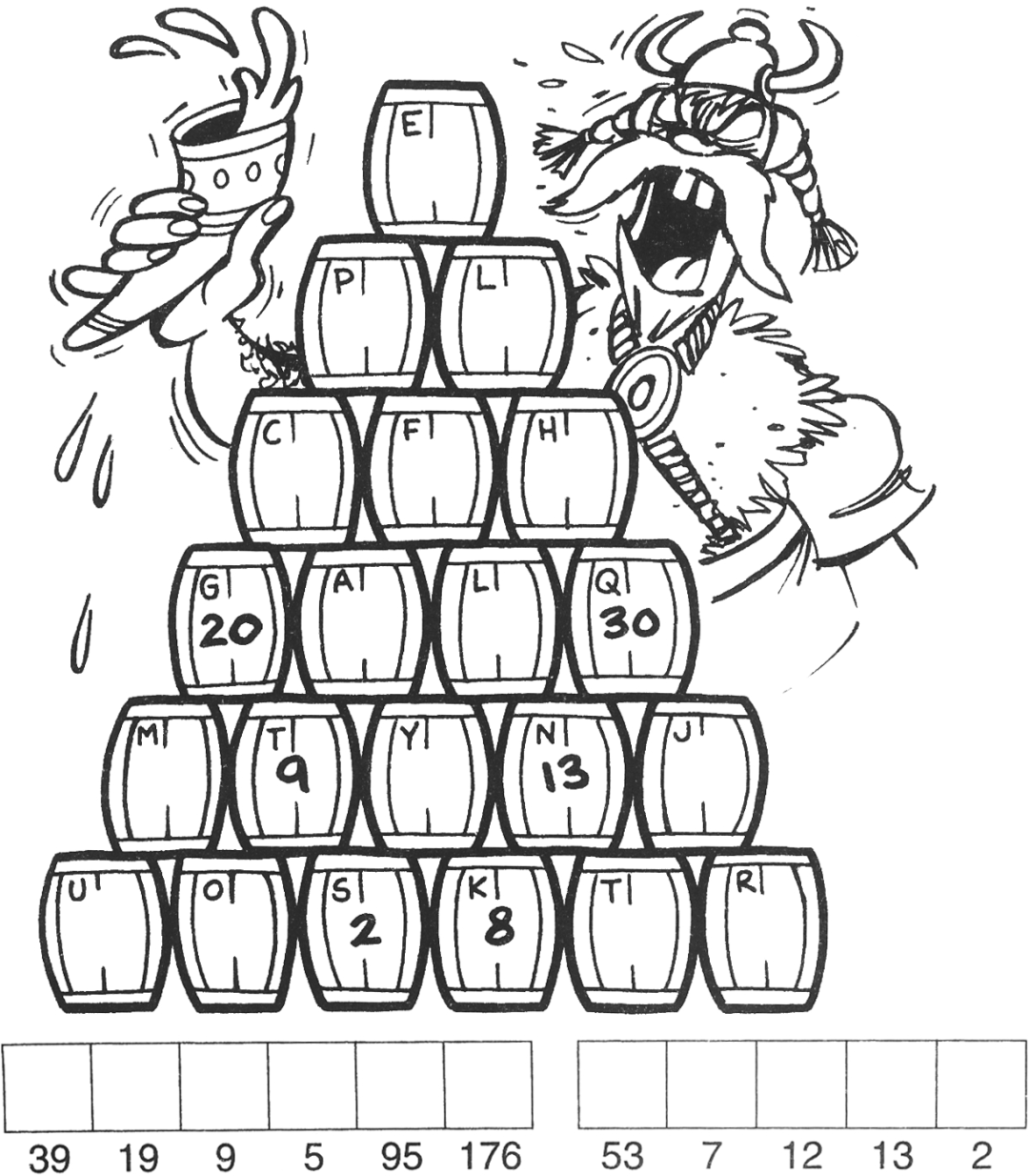
77. That’s a groovy jumper, Joe! There are three pairs of identical squares in the picture. The first two are 2D and 7E, 1A and 2B. Can you find the last pair? Be careful though, as they may not be the same way up as each other.
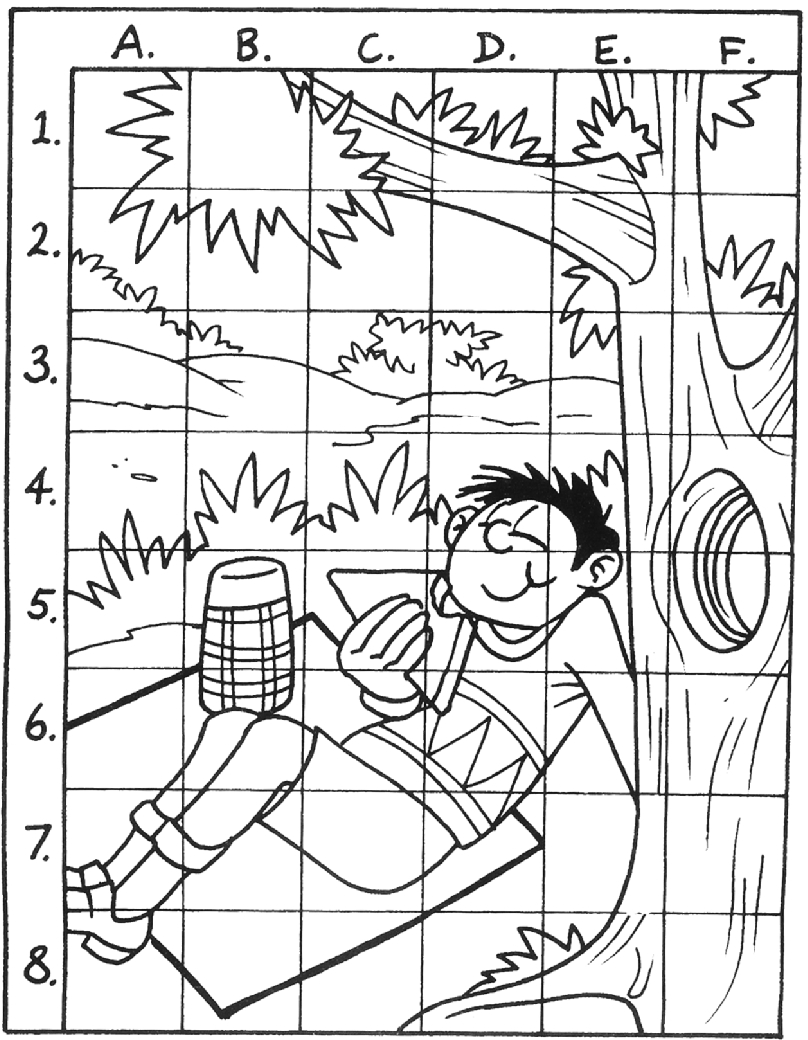
Part VII Error Correction (10 marks)
There are 10 errors altogether in the following passage. The errors are: missing words, unnecessary words and wrong words. Please correct them as follows: for a missing word, mark its position with the symbol“^” and write it; for an unnecessary word, cross it out with the symbol “”; for a wrong word, underline it and write the correct word. An example of how to correct the error is provided below. Write the answers on the answer sheet.

I remember a trip I once made to my grandmother’s house. She lived at about 30 kilometres away from us and we used to go there quite often with our mother. For this occasion we set off to my grandmother after school on a cold winter’s day. When we were about to leave we noticed that some snow was beginning to fall, and as we were driving alone we realized that it was snowing more and more heavily. Suddenly we had to brake hard as the car in front stopped suddenly. We skidded and went off the road into a ditch! It was pretty scary, and we were lucky and none of us were hurt. We got out of the car, and my mother called for help on her mobile phone. While we were waiting for help it stopped snow and we sang lots of songs to keep ourselves cheerfully. Eventually the truck came and pulled our car out of the ditch. The car wasn’t badly damaging, but we decided to return round and go home. We didn’t manage to see our grandmother that day, but it was so frightening that I will never forget.
Part VIII Writing (30 marks)
Section A (10 marks)
88. The chart below shows the average hours worked per day by married men and women in paid employment.
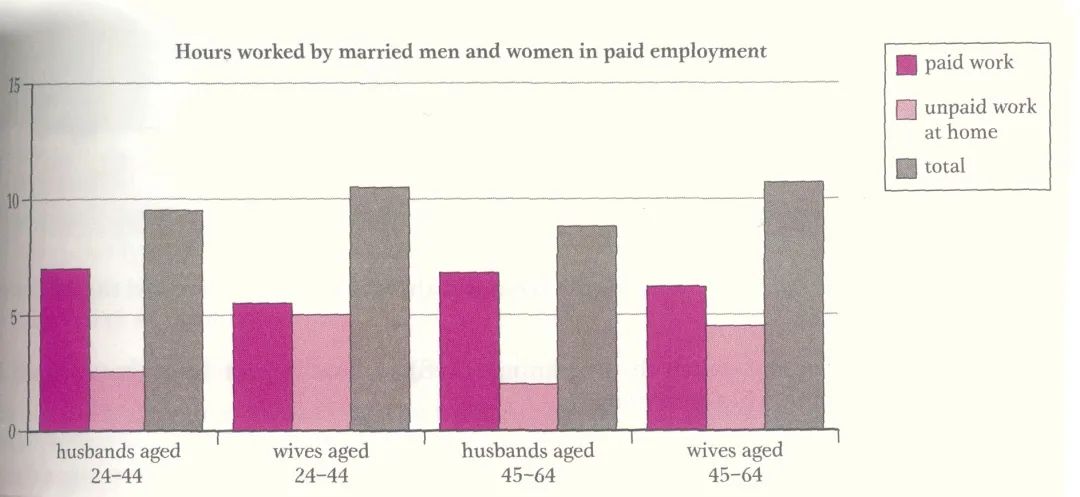
Summarise the information by selecting and reporting the main features, and make comparisons where relevant. You need to write at least 120 words on the answer sheet.
Section B (20 marks)
89. Write about the following topic.
The relationship between human beings and nature is classified into three phases: obeying the changes of nature, reforming nature and trying to keep the harmony with nature. In the first phase, people lived a simple life; the emission of greenhouse gases resulted in glacier melting much faster in the second phase, which brought some catastrophes to human beings; people are trying to improve the environment in the third phase.
Write an essay to cover the topic above on the answer sheet. The essay should be at least 180 words.





